中职英语基础模块1-I can do it
中专英语1(基础模块)unit2
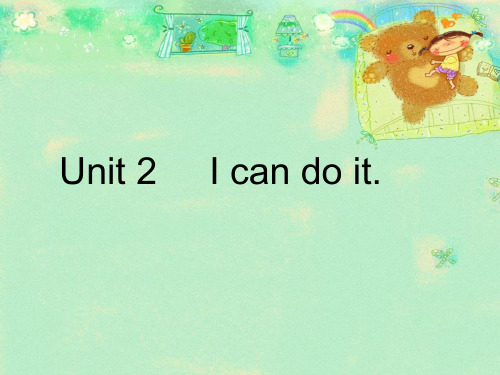
Listening and speaking
3. Listening and Speaking
( ) a. I can drive a car. ( ) b. I can swim. ( ) c. I can use the computer. ( ) d. I can play basketball. ( ) e. I can serve visitors. [‘vɪzɪtə(r)] (为游客服务) ( ) f. I can speak English.
这些方法适用于英语学习。
Language in use (Grammar focus)
Can 的练习题
二、把下列句子变为否定句。
• 1、Lingling ccaan’t ride a horse. • 2、He ccaann’t speak Chinese. • 3、Lingling and Daming ccana’nt play the
apply的用法搭配
2. apply to 适用(运用)于 如: 1)The book does not apply to beginners.
这书不适合于初学者。
注:该结构中的 to 为介词,若后接动词,要用动名词。 如:These methods apply to learning English.
2) He didn’t use his ink. He used mine.
他没有用他自己的墨水,他用了我的。
3) That book is hers, not yours. 那本书是她的,不是你的。
重点词汇和句型
三、反身代词表示“我自己”、“你自己”、“他自己”、“我们自己”、
“你们自己“”他们自己“等代词, 也称”自身代词“。反称代词有人
中职英语基础模块1 期末考试试卷
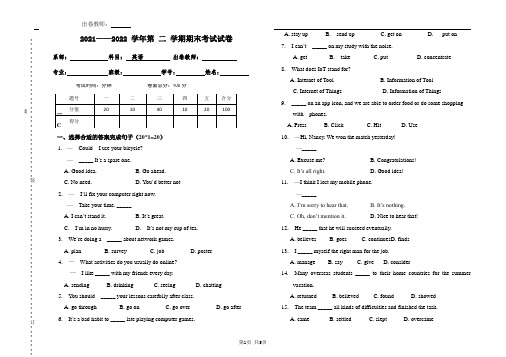
16. The 200-kilometer-long railway was _____ in 1909, two years ahead of schedule.A. stoppedB. hurtC. completedD. promoted17. Sarah showed _____ interest in music at an early age.A. aB. anC. theD. /18. It took the band two and a half days to _____ their music for the movie.A. walkB. eatC. recordD. listen19. I was _____ to him the other day while it was raining heavily outside.A. chattingB. discussingC. enjoyingD. drinking20. —Must I water the flowers now?—No, you _____. You may do it later.A. shouldn’tB. couldn’tC. mustn’tD. needn’t二、阅读并选择最佳答案补全文章(10*1=10)With the invention of the train, people could travel long distances at a higher speed more easily. 21)_____ people are worth remembering for their contributions to this great 22)_____. They are James Watt, Richard Trevithick and George Stephenson.In 1776, James Watt, a British 23)_____ improved the steam engines. He 24)_____ the steam engine and made it an effective source of power. About 30 years later, Richard Trevithick invented steam locomotives. 25)_____ on Watt’s steam engines, he managed to build one of the first steam 26)_____ in 1804. George Stephenson built 27)_____ locomotives for railways. He 28)_____ the world’s first commercial passenger steam locomotive in 1825 and was later called “The Father of Railways”. 29)_____ his efforts, trains gradually became a 30)_____ means of transportation, with railways spreading all over the world.21) A. One B. Two C. Three D. Four 22) A. breakdown B. breakup C. breakout D. breakthrough23) A. pilot B. engineer C. repairer D. teacher24) A. repaired B. moved C. improved D. stayed25) A. Becoming B. Acting C. Working D. Writing26) A. locomotive B. locomotives C. motives D. motive27) A. steam B. gas C. electricity D. energy28) A. produce B. produces C. produced D. producing29) A. After B. Through C. Without D. In30) A. big B. small C. minor D. major三、阅读并选择最佳答案(20*2=40)(A)Zhan Tianyou31) What was Zhan Tianyou’s job?A. A doctor.B. An engineer.C. A secretary.D. A fireman.32) When was Zhan born?A. In 1861.B. In 1881.C. In 1905.D. In 1909.33) How long did Zhan work on the Jingzhang Railway?A. 4 years.B. 14 years.C. 16 years.D. 20 years.34) Where did Zhan go to university?A. In China.B. In the UK.C. In France.D. In the US.35) When Zhan was in his childhood, he was particularly interested in _____.A. MathematicsB. ChineseC. machineryD. drawing(B)For the host:Most importantly, the tea should be served in a friendly way, and the action of serving tea has to be well-mannered. Prepare some milk and hot water so that the guests can have their tea the way they like. Prepare more tea and cake than guests will need, so they’ll feel comfortable and eat as much as they want. If possible, prepare the food by yourself.For the guest:If you are invited to a tea party and would like to bring something to the party, food that you’ve made or flowers will be most welcome. It may be a good idea to discuss it with the people that have been to such a party many times. At the party, you may drink as much as you want. However, you need to finish the cup of tea before passing it to the host for more. If the tea is too strong or bitter, you can use hot water to make it weaker. If some sandwiches or cookies are served, take only one at a time, and then pass them to the next person. Don’t break a cookie into small pieces.36) If you are the host, you _____.A. should buy all the food for the partyB. should serve the tea in a friendly wayC. should serve the same tea to all the guestsD. should prepare some presents for the guests37) Which of the following is true for the guest?A. You can eat only one cookie.B. You can’t drink over three cups of tea.C. You’d better prepare a present for the host.D. You can take one sandwich and one cookie at a time.38) We can infer from the reading that _____.A. you should drink all the tea even if it is too strong or bitterB. good manners are very important for the host and the guestC. it’s a good idea to t ake as much as possible when cookies are servedD. you can pass the cup to the host for more even if you haven’t finished it39) When you come to a tea party for the first time, you’d better _____.A. take the tea you like to the partyB. make some food yourself at homeC. ask the host what you should bringD. ask the people who have been to a tea party for advice40) The passage mainly tells us_____A. Manners at a banquet.B. Manners at a tea party.C. Manners for the host at a tea party.D. Manner for the guest at a tea party.(C)Where do you see yourself in three years? Whether you want to get into a college or to become a skilled worker, Star V ocational High School (SVHS) will prepare you for it.Star Vocational High School41) What is SVHS? It is _____.A. a subjectB. a companyC. a normal high schoolD. a vocational high school42) How many basic subjects are referred in the passage?A. Three.B. Four.C. Five.D. six.43)The introduction of Star V ocational High School is written for _____.A. company staffsB. factory workersC. high school teacherD. middle school students44)If you want to get hands-on experience, you should _____.A. learn basic coursesB. go to normal high schoolsC. work at real companiesD. take part in some school activities45) Which sentence is NOT true according to the passage?A. Students will study special subjects related to your major.B. Students should not spend their time on school activities.C. Students will learn and practice your skills in the training center.D. Students will have all kinds of school trips, clubs, and sports teams to choose from.(D)In many American universities, students should finish thirty-six courses for their degree. A typical course consists of three classes per week for fifteen weeks. A student will attend four or five courses during each semester. It is possible for a student to move between one university and another during his degree course. The scores of the courses will be recorded, and the record will be shown to their future employers. Students will find a better job if they have good scores. Any student who breaks the rules will appear before a student court. Some students would like to take part in the elections (选举) for entering student organizations. A student who is in student organizations is much respected and it will be of benefit to him later in his career.46) How many classes does a typical course have for one semester?A. 3B. 15C. 20D. 4547) According to the first paragraph, an American student is allowed to _____.A. live in a different universityB. live at home and drive to classesC. get two degrees from two different universitiesD. attend four or five courses during each semester48) Why the scores of the courses will be recorded? Because _____.A. teachers need the recordsB. universities need the recordsC. student court needs the recordsD. it is useful for students to find a better job49) Any student who breaks the rules will _____.A. leave the universityB. apologize to the universityC. appear before a student courtD. be shown to their future employers50) Some students would like to enter the student organizations because _____.A. they don’t like their studyB. such positions are usually well paidC. they will be able to stay longer in the universityD. such positions will be of benefit to him later in his career四、选择合适的句子补全对话(10*1=10)(A)Nancy Wilson: Hello Sir, may I help you?John Davis: Yeah, my phone slipped into the water by accident and 51) _____ Nancy Wilson: I see. Well, 52) _____John Davis: Sounds good. I am afraid it shouldn’t be too expensive, a mid-range one will do.Nancy Wilson: OK, please take a look at this one. This HUAWEI mobile phone is pretty good and 53) _____ It has a curved display, built-in cameras, and a large storage space. John Davis: How about the Internet access?Nancy Wilson: 54) _____ so you can enjoy fast access to the Internet wherever you are.You can also surf the Internet via Wi-Fi connection.John Davis: One last thing, 55)_____Nancy Wilson: It’s about 3500 yuan.(B)Li Zixuan: Excuse me. I’m doing a survey about online games.56) _____John Smith: OK, what would you like to ask?Li Zixuan: 57) _____John Smith: Yes, I used to, but not any more.Li Zixuan: 58) _____John Smith: Almost every day.Li Zixuan: Why did you like playing games online?John Smith: It was quite popular among young people. We had a lot to share with friends. Li Zixuan: Then, what made you stop playing those games?John Smith: I often stayed up so late playing games that I couldn’t even concentrate on my study. 59) _____Li Zixuan: It’s really wise to quit before it’s too late. OK, 60) _____John Smith: You are welcome.五、作文(20)请写一封邀请函邀请你的美国同学Tom在6月8日晚上9点整到学校餐厅参加欢迎宴会并品尝中国传统食物。
职业高中基础模块一英语期末试题
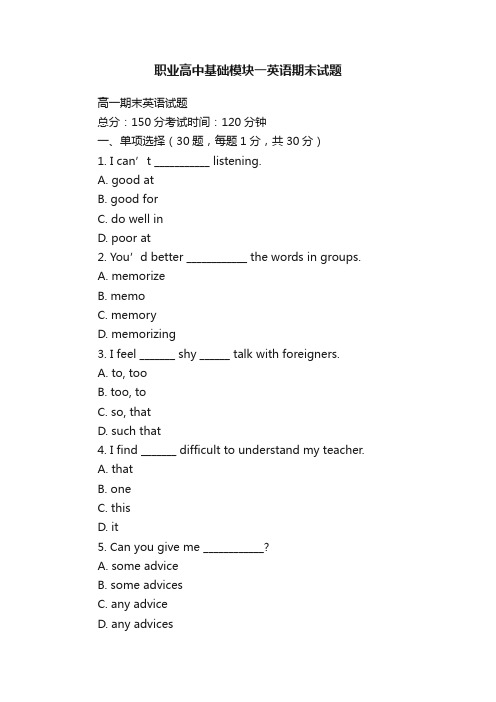
职业高中基础模块一英语期末试题高一期末英语试题总分:150分考试时间:120分钟一、单项选择(30题,每题1分,共30分)1. I can’t ___________ listening.A. good atB. good forC. do well inD. poor at2. You’d better ____________ the words in groups.A. memorizeB. memoC. memoryD. memorizing3. I feel _______ shy ______ talk with foreigners.A. to, tooB. too, toC. so, thatD. such that4. I find _______ difficult to understand my teacher.A. thatB. oneC. thisD. it5. Can you give me ____________?A. some adviceB. some advicesC. any adviceD. any advices6. You can _________ your dictionary.A. usesB. useC. usedD. using7. ------Thank you for helping me.------______________.A. Don’t mention itB. All right.C. SorryD. Excuse me8. ___________ I go work by bus.A. SometimeB. SometimesC. Some timesD. Some time9. If you can’t understand them, you may ask them ________ repeat.A. forB. toC. atD. on10. __________, how much is the membership?A. SorryB. You’re welcomeC. By the wayD. That’s a good idea11. Look, the door is open, you forgot _____________ it this morning.A. lockingC. locked D .to lock12. My parents and I __________ my grandfathers next month.A. will visitB. am going to visitC. are going to visitingD. shall visit13. Before you join the club, you must fill _________ the form.A. outB. inC. onD. to14. _________ go there _________ bike.A. Not, byB. Don’t, byC. Not, onD. Don’t, on15. ________ takes about 30 minutes to get there.A. ThatB. OneC. ItD. This16. The bus stop is ___________ the Art Museum.A. in front ofB. in the front ofC. betweenD. among 17. The children are looking forward to ___________ .A. swimB. swimmingC. swims18. -----What is he doing now?-----He ___a picture.A. drawsB. drewC. is drawingD. was drawing19.Joe the book last year? –No, he it last week.A. Does, buy , buys B Did , buy , boughtC ,Are buying , is buyingD will , buy , bought20.______ Alice speak English?A. Do B .Does C. Are D. Is21.Two ______ of these apples are green.A. thirdsB. thirdC. fifthD. threes22. This is your bag, ______is over there.A myB meC ID mine23. There ______many books in the bookcase .A areB isC wasD am24.------How’s the weather today?------__________ .A It’s a fine day.B Yes, it is.C It’s springD No, it isn’t.25.They ______ clean their classroom once a week.A isn’tB aren’tC don’tD doesn’t26.I’m sure you will be in this play.A. interestsB. interestingC. interestedD. interest27. Mother is ______ in the members of my family.A. busierB. the busiestC. busiestD. busy28. ------Excuse me, can you tell me where the nearest bank is, please?------ ______ Oh yes! It's past the office, next to a big market.A. You're welcome.B. Oh, I beg your pardon?C. Mm, let me think.D. What do you mean?29. Our school will become ______better in a few years.A. veryB. evenC. moreD. quite30. There _______ a football match on TV this evening.A will haveB is going to beC hasD is going to have二、完形填空(20题,每题1分,共20分)I arrived in the United States on February 6, 1996, but I remember my first day here very clearly. My friend was waiting for me when my plane landed at Kennedy Airport at three o’clock in the afternoon. The weather was very 31 and it was snowing, but I was __32___ excited to mind. From the airport, my friend and I took a taxi to my_33 . On the way, I saw the skyline(轮廓) of Manhattan for the 34 time and I stared in surprise at the famous skyscrapers(摩天大楼) and their manmade___35____. My friend helped me unpack (卸下包袱)at the hotel and then left because he had to go back to work. He promised() to return the next day.Shortly after my friend had_36____, I went to a _37____near the hotel to get something to eat. Because I couldn’t speak a single__38___ of English, I couldn’t tell the__39___ what I wanted.I was very upset and started to make some___40___, but the waiter didn’t_ 41____ me. Finally, I ordered the same thing the man at the next table was__42___. After dinner, I started to walk along Broadway____43_ I came to Times Square with its cinemas, theatres, neon lights, and huge crowds of people. I did not feel tired, so I__44___ to walk around the city. I wanted to see__45___ on my first day. I knew it was___46__, but I wanted to try.When I returned to the hotel, I was__47___, but I couldn’t__48___ because I kept hearing the fire and policesirens(警笛)during the night. I lay___49___ and thought about New York. It was a very big and interesting city with many tall buildings and big cars, and full of_ 50____ and busy people. I also decided right then that I had to learn to speak English.31. A. warm B. hot C. cold D. cool32. A. too B. to C. so D.such33. A. school B. hotel C. home D. office34. A. first B. second C. last D. only35 .A. parks B. satellites C. beauty D. lakes36. A.left B. come C. told D. wanted38. A. sentence B. little C word D. phrase39. A. boss B. cook C. waiter D. man40. A. letters B. books C. schools D. gestures (手势)41. A. listen to B. understand C. see D. serve42. A. reading B. writing C. ordering D. eating43. A. until B. when C. before D. after44. A. listened B.looked C. decided D. found45. A. nothing B. everything C. no things D. some one46. A. necessary B. important C. impossible D. right47. A. tired B. excited C. surprised D. pleased48. A. go out B. eat C. have a bath D. fall asleep 49. A. afraidB. awakeC. aloudD. asleep50. A. noise B. streets C. places D. rivers三、阅读理解(30题,每题2分,共60分)AMary’s parents are going to give a birthday party for her .She’s going to be fourteen years old .Mary has a lot of friends .They are going to come to the party .They are girls from Mary’s school. There are twenty-five of them.Mary’s mother is making birthday cakes for the party. Theyare very nice cakes. Mary says to her mother, “Mum, you are ve ry nice .Thank you for your nice cakes.”Her father is going shopping .He buys a lot of apples, bananas, oranges and pears.It’s four o’clock in the afternoon .Now everything is ready. And the party begins in thirty minutes.51. Who is going to give Mary a birthday party?A. MaryB. Her friendsC. Her teacherD. Her parents52.How many people are going to Mary’s party?A .Two B. Twenty C .Twenty-one D. Twenty-five53.Her mother ______for her party.A. is making cakes B .is shoppingC. is buying applesD. makes a cake54. How old is Mary going to be ?A .12 B.13 C.14 D.2055. What time does the party begin?A .At four B. At half past fourC. At thirtyD. At half past thirtyBSkin-diving (潜泳)is a new sport today. This sport takes you into a wonderful new world. It is like a visit to the moon. When you are under water, it is easy for you to climb big rocks, because you are no longer heavy.Here, under water, everything is blue and green. During the day ,there is enough light. When fish swim nearby (在附近),you can catch them with you hands.When you have tanks(罐) of air on your back, you can stay in deep water for a long time, but you must be careful when you dive (潜入) in deep water.To catch fish is one of the most interesting parts of this sport. Besides(而且), there are most uses for skin-diving. You can clean ships without taking them out of the water. You can get many things from the deep sea.Now you see that skin-diving is both useful and interesting.56.Skin-diving will take you to _______A. the moonB. be in dangerC. mountainsD. the deep sea57. You can climb big rocks under water because______.A. you are strongerB. the fish nearby help youC. you are not as heavy as on the landD. there is a lot light58. Under water, a skin-diver _____ in the day-time.A. can see everything clearlyB. can’t see anything clearlyC. can see nothingD. can catch fishes59.With a tank of air on your back, you can ______.A. catch fish very easilyB. stay under water for a long timeC. can see nothingD. can see only fishes60.Which of the following sentences is NOT TRUE ?A Skin-diving is a new sport .B Skin-diving is like visiting the moon.C The only use of skin-diving is to have more fun.D Skin-diving is both interesting and useful.COne day, an old woman visited Balzac, the great French writer. She took out a pupil’s composit ion book, then said “ Mr. Balzac, you are a famous writer, so I want you to look at this book and tell me how about it . Does the child have a good future in writing?” After taking a quic k look, Balzac asked the woman whether she was the child’s relative (亲戚) or not. She gave a negative answer. Then Balzac said, “ to tell the truth, the student is ordinary. He will make no progress in writing.” The woman studied Balzac, and asked, “can’t y ou recognize your handwriting? This is your notebook . ”Hearing what the woman said, Balzac felt ashamed to forget his teacher and deeply moved that his teacher kept his composition on book. He made an apology to her at once.61.Balzac was a great French writer , maybe he lived inA London B. New York C. Paris D. Washington62.The old woman wasA. a teacher B a worker C a doctor D a nurse63 The old woman visited Balzac becauseA. she wanted to help himB. she wanted to ask for helpC. she wanted to borrow some moneyD. she wanted him to say something about the composition in the book .64 Balzac said that the child when he grew up .A. would be a good teacherB. would be a doctorC. would be a good writerD. would not be good writer65 Balzac felt ashamed because .A. he had forgotten his teacherB. he had lost his composition bookC. he couldn’t say anyt hing about the composition .D. he was afraid of seeing the woman.DIn recent years, A girl may pass easily through the first grade, while boys of her age bring home low marks , the girl may easily get good marks . Girls seem to have “ Better brains” in school. Why do so few girls become great scientist ? Why the most important thinking in adult done by men.According to scientist the answer is aggression( 进取) .Boys usually refuse to accept other people’s conclusion. They insist on solving problem by themselves , while girls are getting high marks in school for remembering what the teacher has told them , little boys are learning to think in their ways. Boys are usually the ones who get high pay and the powerful job because they are trained to be aggression(叛逆) at an early age.66. Why do girls get better marks at school than boys?A. Because girls are clever at school than boys.B. Because girls are better at remembering things than boys.C. Because teacher are more for girls than for boys.D. Because boys are lazier .67.Why are there so few women scientist ?A. because girls are lazierB. because girls are less cared forC. because boys are cleverer than girls.D. because few of them are trained to be aggression.68. According to the scientistsA. boys are good at thinking in their own ways while girls are good at remembering things.B. Boys can ea sily get good job while girls can’t.C. girls insist on doing things on their own.D. the nature of the boys and girls is the same , but their education is different.69.In the view of the writer .A. girls have better brains,B. boys have better brains.C. neither boys nor girls have better brains.D. usually great scientist are men and most important things are done by men.70. Which of the following is the right?A. Boys are clever at school.B. Girls are clever at early ageC. Boys can be useful only when they enter the adult world.D. Boys and girls are useful in different way.EMr. and Mrs. Turner live outside a small town. They have a big farm and they are always busy working on it. Their son, Peter, studied at a middle school. The young man studied hard and did well in his lessons. It made them happy.Last month Peter finished middle school and passed the entrance examination. Mrs. Turner was very happy and told the farmers about it.Yesterday morning the woman went to the town to buy something for her son. On the bus she told one of her friends how cleaver and able her son was. She spoke very loudly. All the people in the bus began to listen to her.“Which university will your son study in?” a woman next to her asked.“In the most famous university in our country!” Mrs. Turner said proudly.“The most famous university?”“Oxford(牛津)university.”Most of the passengers looked at her carefully. Some of them said to her, “Congratulation!”A woman said, “ I’m sure he’ll know Fred Smith.”“Who’s Fred Smith?”“He’s my son.”“Does he study in the university, too.?”“No, said the woman. “ He is one of the professor.”71. The story happened in ________.A. AmericaB. FranceC. GermanyD. England72. Mr. and Mrs. Turner were happy because ________.A. their son did well in his lessonsB. they have a big farmC. they have a good harvestD. their son studied at a middle school73. Mrs. Turner wanted everyone to know ________.A. her son finished middle schoolB. her son was handsomeC. her son was going to study in a universityD. her son was very friendly to others74. Mrs. Turner spoke so loudly in the bus that __________.A. her friend could hear herB. all the people could hear herC. she hoped to make all the people happyD. she hoped they would say something to her75. Which of the following is true?A. The woman was n’t interested in Mrs. Turner’s words.B. Mrs. Turner knew nothing about the famous university.C. The woman wanted to stop Mrs. Turner from showing off(炫耀) .D. The woman next to Mrs. Turner didn’t like her.FA pretty, well-dressed young lady stopped a taxi in a big square, and said to the driver. “ Do you see that young man at the other side of the square?”“Yes,” said the taxi driver. The young man was standing outside a restaurant and looking impatiently at his watch every few seconds.“Take me over there,” said the lady.There were a lot of cars and buses and trucks in the square. So the taxi driver asked, “ Are you afraid to cross the street?”“Oh, no!” said the young lady. “But I said that I would meet that young man for lunch at one o’clock, and it is now a quarter to two. If I arrive in a taxi, it will at least seem as if I have tried not to be too late.”76. How did the young woman get to the square?A. She got there on footB. She got there by busC. The story doesn’t tell us about itD. She arrived in a taxi77. Why did she want to take a taxi?A. Because the square was too crowdedB. Because she was too tired to walkC. Because she wanted to be seen in a hurryD. Because she wanted not to be late for the appointment78. The young man at the other side of the square_______.A. had some problem with his watchB. was probably a waiter of the restaurantC. had probably been waiting for a long timeD. was someone the young woman did not want to see79. The young lady was ______.A. clever at making excuseB. not late at allC. 45 minutes earlierD. 15 minutes late80. Had she tried not to be so late?A. No, she was just going to pretend(假装) that she had triedB. No, she thought being late was better than being earlierC. Yes, she had at least tried not to be too lateD. Yes, she had tried her best though she couldn’t succeed四、填写正确单词补全对话。
中职英语基础模块一学案答案.docx
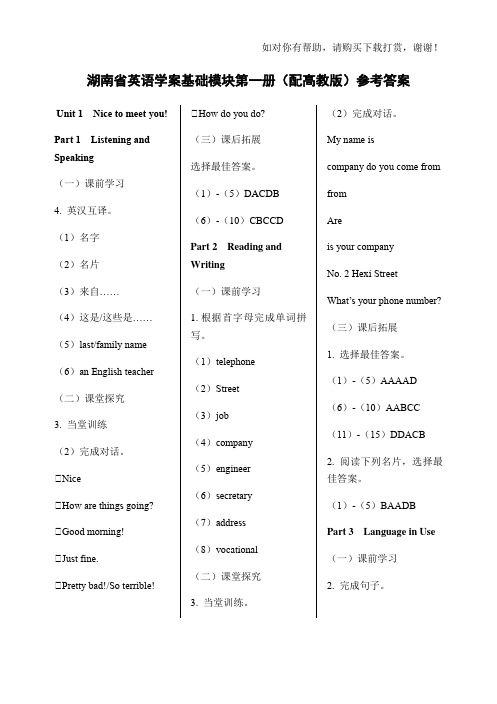
湖南省英语学案基础模块第一册(配高教版)参考答案Unit 1 Nice to meet you!Part 1 Listening and Speaking(一)课前学习4. 英汉互译。
(1)名字(2)名片(3)来自……(4)这是/这些是……(5)last/family name (6)an English teacher (二)课堂探究3. 当堂训练(2)完成对话。
①Nice②How are things going?③Good morning!④Just fine.⑤Pretty bad!/So terrible!⑥How do you do?(三)课后拓展选择最佳答案。
(1)-(5)DACDB(6)-(10)CBCCDPart 2 Reading andWriting(一)课前学习1.根据首字母完成单词拼写。
(1)telephone(2)Street(3)job(4)company(5)engineer(6)secretary(7)address(8)vocational(二)课堂探究3. 当堂训练。
(2)完成对话。
My name iscompany do you come fromfromAreis your companyNo. 2 Hexi StreetWhat’s your phone number?(三)课后拓展1. 选择最佳答案。
(1)-(5)AAAAD(6)-(10)AABCC(11)-(15)DDACB2. 阅读下列名片,选择最佳答案。
(1)-(5)BAADBPart 3 Language in Use(一)课前学习2. 完成句子。
(1)am a student(2)My father is anengineer.(3)Is(4)doctor; patients(5)Are they teachers?No, they are doctors. (二)课堂探究3. 当堂训练。
英语基础模块1-unit2-i-can-do-it-课件
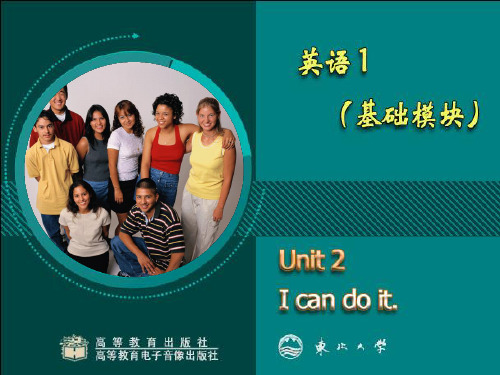
Mr Zhang: Can you sing English songs?
Bill:
Yes, I can.
Mr Zhang: That’s good.
Activity 7
Listen and repeat. 跟读对话,学说选出的语句。
Bill:
Good morning, sir!
Mr Zhang: Good morning! Your name, please?
Activity 5
Listen and circle. 听录音,在活动4的字母序号上圈出张 青能做的事。
a. I can drive a car.
c. I can use the computer.
e. I can serve visitors.
Activity 6
Read and underline. 阅读对话,用下画线标出询问和谈 论能力的语句。
Activity 2
Listen and circle. 听录音,圈出上图中Ben能做的事。
1) I can speak Chinese.
5) I can teach English. 6) I can drive cars.
Activity 3
Think and talk. 想一想,与同伴谈论自己能做的事。
教学目标
语言知识目标: 学生能够理解并运用常用动词及can 询问并给出有关个人能力的信息。 语言技能目标: 听 —— 学生能够理解用情态动词can 表述的有关个人能力的介绍。 说 —— 学生能够用情态动词can 做有关个人能力的介绍。 读 —— 学生能够读懂有关个人信息及个人能力的表格及简单句。 写 —— 学生能够根据个人情况做简单介绍并用情态动词can 表述个人能力。 学 习 策 略: 学生在英语学习中发现问题并及时寻求解决方法。 文 化 意 识: 学生掌握中国人与英美国家的人们在询问个人信息时的不同习惯。 情 感 态 度: 学生了解不同职业所需的技能,并明确自己在学习过程中需要掌握的技能。 单 元 任 务: 学生能够运用所学语言填写简单的求职表。
高教版中职英语基础模块-第1册unit-2《i-can-do-it》教案.doc
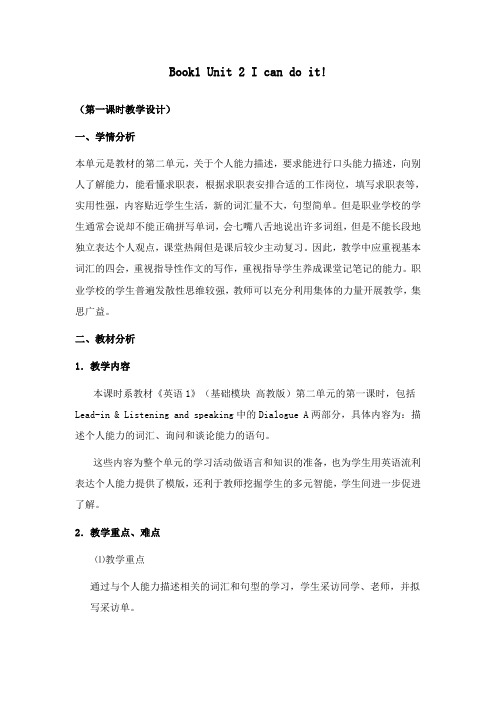
Book1 Unit 2 I can do it!(第一课时教学设计)一、学情分析本单元是教材的第二单元,关于个人能力描述,要求能进行口头能力描述,向别人了解能力,能看懂求职表,根据求职表安排合适的工作岗位,填写求职表等,实用性强,内容贴近学生生活,新的词汇量不大,句型简单。
但是职业学校的学生通常会说却不能正确拼写单词,会七嘴八舌地说出许多词组,但是不能长段地独立表达个人观点,课堂热闹但是课后较少主动复习。
因此,教学中应重视基本词汇的四会,重视指导性作文的写作,重视指导学生养成课堂记笔记的能力。
职业学校的学生普遍发散性思维较强,教师可以充分利用集体的力量开展教学,集思广益。
二、教材分析1.教学内容本课时系教材《英语1》(基础模块高教版)第二单元的第一课时,包括Lead-in & Listening and speaking中的Dialogue A两部分,具体内容为:描述个人能力的词汇、询问和谈论能力的语句。
这些内容为整个单元的学习活动做语言和知识的准备,也为学生用英语流利表达个人能力提供了模版,还利于教师挖掘学生的多元智能,学生间进一步促进了解。
2.教学重点、难点⑴教学重点通过与个人能力描述相关的词汇和句型的学习,学生采访同学、老师,并拟写采访单。
⑵教学难点学生了解词汇记忆的策略之一——分类记忆;学生区分出不同购物场所的特点;三、教学目标1.知识目标⑴学生能掌握描述个人能力的词汇,如speak Chinese, drive cars, repair puters, teach English, read in Chinese, serve customers。
⑵学生能掌握询问和描述个人能力时所使用的句型,如:Can you say something about yourselfCan you sing English songsWell, I can teach English and I can speak a little Chinese.2.能力目标⑴学生能听懂关于询问和描述个人能力的对话。
职高英语基础模块 Unit Two I can do it

New words
• repair /ri`pεə/ 修理 • computer /kəm`pju:tə/ 计算机 • Serve /sə:v/ 服务 • customer /kʌstəmə/ 顾客 • teach /ti:tʃ/ 教,教书 • something /`sʌmθiŋ/ 一些事 • yourself /jɔ:`self/ 你自己 • join /dʒɔin/ 参加 • club /klʌb/ 俱乐部 • ability /ə`biləti/ 能力 • application /æpli`keiʃən/ 申请 • employment /im`plɔimənt/ 工作,职业 • gender /`dʒendə/ 性别 • position /pə`ziʃən/ 职位 • french /frentʃ/ 法语,法国的 • apply for 申请 • sales manager 销售经理 • in English 用英语 • I’d like to… 我想…
2021/7/17
8
Listen and repeat.
• Bill :Good morning ,sir. • Mr Zhang: Good morning! Your name,
please? _ what’s your name ?_
• Bill: I’m Bill Brown. • Mr Zhang: can you say something about
2021/7/17
9
Read and underline
• Wang Yang: Excuse me . I’d like to join the Computer Club. • Tang Hua: OK. What’s your name? • Wang Yang: Wang Yang. • Tang Hua: How old are you ? • Wang Yang: I’m seventeen. • Tang Hua: Which class are you in? • Wang Yang: I’m in Class3,Grade 1. • Tang Hua: Can you use the computer? • Wang Yang: Yes ,I can send e-mails, and I can play computer
英语1(基础模块)第2版--unit-2-知识点及练习
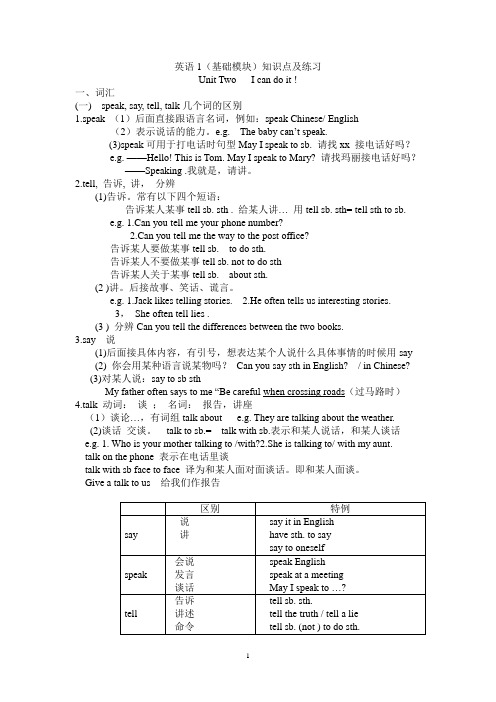
英语1(基础模块)知识点及练习Unit Two I can do it !一、词汇(一) speak, say, tell, talk几个词的区别1.speak (1)后面直接跟语言名词,例如:speak Chinese/ English(2)表示说话的能力。
e.g. The baby can’t speak.(3)speak可用于打电话时句型May I speak to sb. 请找xx 接电话好吗?e.g. ——Hello! This is Tom. May I speak to Mary? 请找玛丽接电话好吗?——Speaking .我就是,请讲。
2.tell, 告诉, 讲,分辨(1)告诉。
常有以下四个短语:告诉某人某事tell sb. sth . 给某人讲… 用tell sb. sth= tell sth to sb.e.g. 1.Can you tell me your phone number?2.Can you tell me the way to the post office?告诉某人要做某事tell sb. to do sth.告诉某人不要做某事tell sb. not to do sth告诉某人关于某事tell sb. about sth.(2 )讲。
后接故事、笑话、谎言。
e.g. 1.Jack likes telling stories. 2.He often tells us interesting stories.3,She often tell lies .(3 ) 分辨Can you tell the differences between the two books.3.say 说(1)后面接具体内容,有引号,想表达某个人说什么具体事情的时候用say(2) 你会用某种语言说某物吗?Can you say sth in English? / in Chinese?(3)对某人说:say to sb sthMy father often says to me “Be careful when crossing roads(过马路时)4.talk 动词:谈;名词:报告,讲座(1)谈论…,有词组talk about e.g. They are talking about the weather.(2)谈话交谈。
中职高教版英语1基础模块(1--4单元教案)
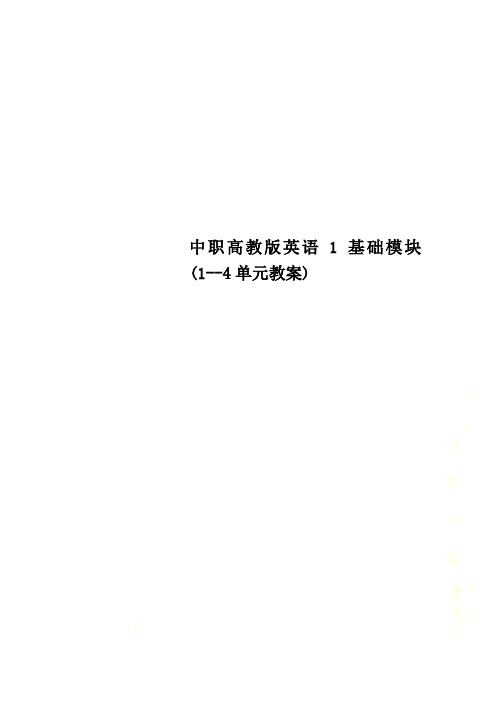
【学生学习情况检测】
1.Activity 19. Write and talk. Talk about your parents and the persons that you know with your partner and take notes of what your partner tells you. Eg. My father’s name is Li Ming. He is a doctor.
5.Listen more and improve the listening ability step by step, keep the sound symbol in mind.
pare English with Chinese and find the differences in language points.
课后分析:
NO:5-6
课程名称
英语
授课时数
2
周 次
第周
教学内容
Unit 2 I can do it.
Lead-in, Listening and Speaking, Reading and Writing
教学方式
Theory
Practicing
【主要教学内容】
Content:
1、Have a revision ofkeywords and expressionsof Unit 1.
3.Ask questions and help the students to understand the main idea of each lesson.
中职英语基础模块上册unit1(完整版)

a pat on the back
a hug
拥抱:在欧美、中东及南美洲常见的礼节, 一般用于熟人和朋友之间,有时伴随着接吻礼, 是比较亲密的一种见面礼仪。这种礼仪一般用 于同性或者亲密的异性之间。
1.w_______ (欢迎) 2. v _______ (职业的) 3. g_______ (高兴的) 4. m________(遇见,汇合,迎接) 5. l______(看,瞧,看起来,显得... ) 6. c______ (教室) 7. b________ (建筑物,楼房) 8. l________ (实验室) 9. f_____(楼层,地板) 10. l________ (大的) 11. b_______ (明亮的) 12. c__(班级,课节)
❖every
❖ adj. 每一个;每个
❖love
❖ v.热爱;爱好
❖hard
❖ adv.努力地;adj.硬的;难的
❖thank
❖ v./n.感谢
thank …for… 为…而感谢…
例句:谢谢你的帮助。eg. Thank you for your help.
❖visit ❖time ❖English ❖want ❖desk ❖chair
a bow
鞠躬:日本是一个极其注重礼节的国家,见面时一般 都要互相问候,脱帽鞠躬,眼睛向下,表示诚恳的态度。 日本妇女温柔体贴,每天鞠躬无数次,对男子亦十分尊 重。除了日本之外,朝鲜人见面也行鞠躬礼。
a kiss on the cheek
接吻礼:接吻礼是西欧流行在亲人、朋友、夫妻之间的 亲昵礼节,一般只能在受礼者脸颊上轻吻一下,不能发出声 音。感情激烈时,比如说遇到喜事或丧事,也可以使用接吻 礼,表示兴奋或者安慰、同情。
中职教材高一年级英语 I can do it. 教学设计
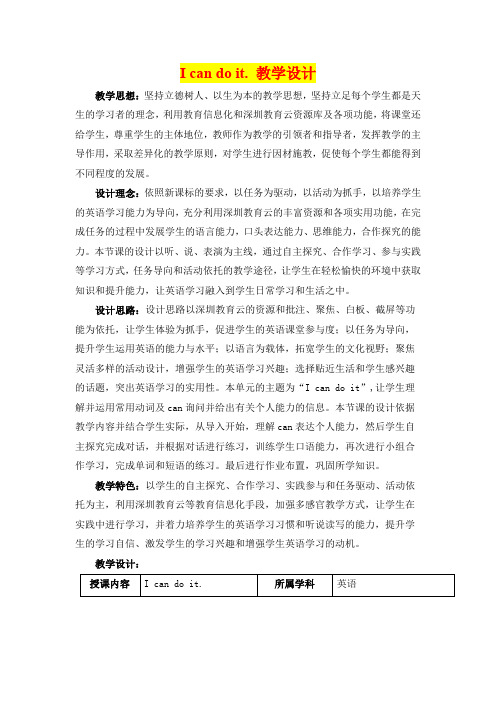
I can do it. 教学设计教学思想:坚持立德树人、以生为本的教学思想,坚持立足每个学生都是天生的学习者的理念,利用教育信息化和深圳教育云资源库及各项功能,将课堂还给学生,尊重学生的主体地位,教师作为教学的引领者和指导者,发挥教学的主导作用,采取差异化的教学原则,对学生进行因材施教,促使每个学生都能得到不同程度的发展。
设计理念:依照新课标的要求,以任务为驱动,以活动为抓手,以培养学生的英语学习能力为导向,充分利用深圳教育云的丰富资源和各项实用功能,在完成任务的过程中发展学生的语言能力,口头表达能力、思维能力,合作探究的能力。
本节课的设计以听、说、表演为主线,通过自主探究、合作学习、参与实践等学习方式,任务导向和活动依托的教学途径,让学生在轻松愉快的环境中获取知识和提升能力,让英语学习融入到学生日常学习和生活之中。
设计思路:设计思路以深圳教育云的资源和批注、聚焦、白板、截屏等功能为依托,让学生体验为抓手,促进学生的英语课堂参与度;以任务为导向,提升学生运用英语的能力与水平;以语言为载体,拓宽学生的文化视野;聚焦灵活多样的活动设计,增强学生的英语学习兴趣;选择贴近生活和学生感兴趣的话题,突出英语学习的实用性。
本单元的主题为“I can do it”,让学生理解并运用常用动词及can询问并给出有关个人能力的信息。
本节课的设计依据教学内容并结合学生实际,从导入开始,理解can表达个人能力,然后学生自主探究完成对话,并根据对话进行练习,训练学生口语能力,再次进行小组合作学习,完成单词和短语的练习。
最后进行作业布置,巩固所学知识。
教学特色:以学生的自主探究、合作学习、实践参与和任务驱动、活动依托为主,利用深圳教育云等教育信息化手段,加强多感官教学方式,让学生在实践中进行学习,并着力培养学生的英语学习习惯和听说读写的能力,提升学生的学习自信、激发学生的学习兴趣和增强学生英语学习的动机。
教学设计:。
中职高教版英语1基础模块 (1--4单元教案)
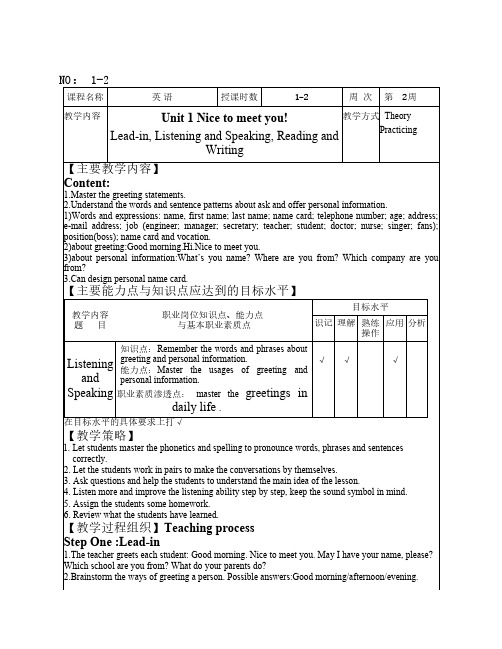
1. Make a short summary of what we’ve learned today.(1)key vocabulary. (2)everyday English about greetings and personal information. 2.Think of ten ways of greetings. 3.Remember how to design a personal name card.
Step Two: Listening and speaking
1.Activity 4. Listen and underline. Listen to dialogue A and underline the sentences about greeting a person. 2.Practice a similar dialogue with your partner. 3.Activity 8. Listen and complete. Listen to dialogue B , and fill in the following form. 4.Guess the meaning of “last name” and “first name”. 5.Activity 9. Read and underline. Practice the dialogue with your partner and underline the sentences about asking one’s personal information. 6.Make a similar dialogue with the classmates around you. Sample A: Good morning! I’m Lu Zhongnan. Lu is my last name and Zhongnan is my first name. May I have your name, please. B: Good morning! I’m Lin Chunning. Lin is my last name and Chunning is my first name. A: Nice to meet you. I’m from No. 7 Middle school. Where are you from?B: Nice to meet you, too. I’m from No.15 Middle school. 7.Ask some pairs to demonstrate their performance(greet each other and ask for personal information). 8.Activity 12. Talk and complete. Talk to five classmates and ask about their first name, last name and which school they are from. And then fill in the form.
中职英语 基础模块1 Unit2
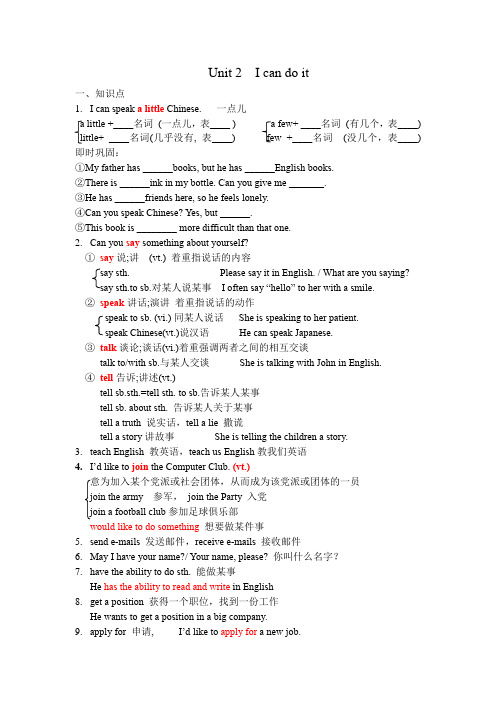
Unit 2 I can do it一、知识点1.I can speak a little Chinese. 一点儿a little +____名词(一点儿,表____ ) a few+ ____名词(有几个,表____) little+ ____名词(几乎没有, 表____) few +____名词(没几个,表____) 即时巩固:①My father has ______books, but he has ______English books.②There is ______ink in my bottle. Can you give me _______.③He has ______friends here, so he feels lonely.④Can you speak Chinese? Yes, but ______.⑤This book is ________ more difficult than that one.2.Can you say something about yourself?①say说;讲(vt.) 着重指说话的内容say sth. Please say it in English. / What are you saying?say sth.to sb.对某人说某事I often say “hello” to her with a smile.②speak讲话;演讲着重指说话的动作speak to sb. (vi.)同某人说话She is speaking to her patient.speak Chinese(vt.)说汉语He can speak Japanese.③talk谈论;谈话(vi.)着重强调两者之间的相互交谈talk to/with sb.与某人交谈She is talking with John in English.④tell告诉;讲述(vt.)tell sb.sth.=tell sth. to sb.告诉某人某事tell sb. about sth. 告诉某人关于某事tell a truth 说实话,tell a lie 撒谎tell a story讲故事She is telling the children a story.3.teach English 教英语,teach us English教我们英语4.I’d like to join the Computer Club.(vt.)join the army 参军,join the Party 入党join a football club参加足球俱乐部would like to do something想要做某件事5.send e-mails 发送邮件,receive e-mails 接收邮件6.May I have your name?/ Your name, please? 你叫什么名字?7.have the ability to do sth. 能做某事He has the ability to read and write in English8.get a position 获得一个职位,找到一份工作He wants to get a position in a big company.9.apply for 申请, I’d like to apply for a new job.10.I can serve customers 为顾客服务,serve sb. 为某人服务11.get upset 感到不安Now, don’t get upset about your illness.get angry变得生气If you do that again, I'll get angry.二、语法: can 的用法情态动词;没有人称和数的变化;后接动词原形;①表示能力,意为“能、会”,可与be able to转换。
高教版中职英语(基础模块 第1册)Unit 2《I can do it》ppt课件1
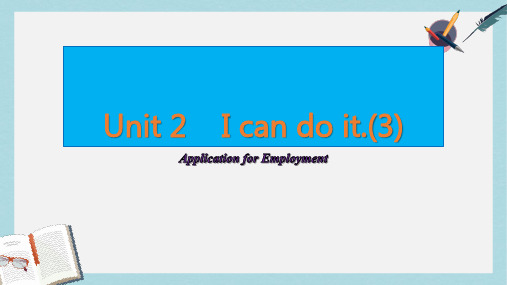
Activity 12
Think and tick. 从下列条目中勾出你认为在求职申请表中 应包含的要素。
□ n□anmaeme
□pho□npehnounme bneurmber
□ a□gaege □ ambailiitl y
□ e-mail □ e-
□ address
□ f□amabilyility
Drive a car.
Read and tick. 勾出你认为求职需要具备的能力。
I can drive a car. I can swim.
I can play basketball I can sever visitors.
I can speak good English. I can love to work with others . I can use the computer very well.
Tang Hua: Ok. That’s it.
Wang Yang: Thank you.
Act and practice. 用下面的语句和信息模仿求职者进行面试。
WhaAt’: Ws yhoautr’nsaymoeu?r name? WhaAt’: Hs oyowuor lfdirsatrneaymoeu?/ last name? WheAre: Caraenyyoouufr…om? ?
在英语国家,年龄 (age) 是个敏 感的话题,除非确有需要,如填 写个人信息等,一般不要问成年
Tang Hua: Can you use the comp人u,te尤r其? 是成年女性的年龄。
Wang Yang: Yes, I can send a e-mail and play computer games.
《I can do it》中职英语(基础模块 第1册)Unit 2【高教版】1
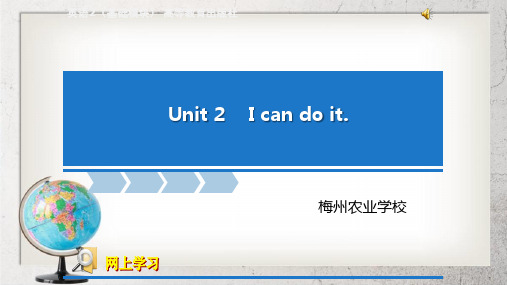
Unit 2 I can do it.
梅州农业学校
Unit 2 I can do it.(3)
教学目标
知识能力目标 学生能够理解并运用常用动词及can 询问并给出有关个人能力的信息。 学生能够读懂有关个人信息及个人能力的表格及简单句。 学生能够根据个人情况做简单介绍并制作求职申请表
Htoe awpapnlytsftoor?apply for a sales manager position . d. What’s Wang Tong’s e-mail address?
WangDong@
Compare and choose. 比较两份求职表,你认为谁能得到这个职位.
I you Yes, he / she / it can. we you they
I
you
he / she / it
Can we
…?
you
they
I
you
No,
he / she / it
we
you
they
can’t.
Look and complete. 看图,完成句子。
1) I can _ru__n____________.
Read and answer. 阅读求职表,勾出求职表后正确的句子。
a.
Name Wang Tong
Age 23
Address No. 28 Tongfang Street, Tianjin
Position applied Sales Manager Abilities I can use the computer. I can speak English. I can read and write in English. …
高教版中职英语(基础模块-第1册)Unit-2《I-can-do-it》ppt课件1全

□ family
□ parents
Activity 13
Read and circle. 阅读求职表,圈出申请表中包含 的要素。
name
phone number
age ability
e-
mail address
Unit task
application 2CCCCCC) CCCCCCCCCCCNow complete your application form in 2015. form
b. Name Sally Smith Age 25
Address No. 4 Hexi Street, Tianjin
Position applied Sales Manager
Abilities I can use the computer. I can drive a car. I can write in English and French. …
Choose and guess. 各自选出下面的一种职业,通过与同伴 问答猜出对方的职业。
eg Group members: Can you …? You: Yes, … / No, …
( ) ask for personal information.
( ) fill in an application form. ( ) use “can”. ( ) talk about abilities.
I you Yes, he / she / it can. we you they
I
you
he / she / it
Can
we
…?
you
they
I
you
No,
高教版中职英语基础模块-第1册unit-2《i-can-do-it》教案
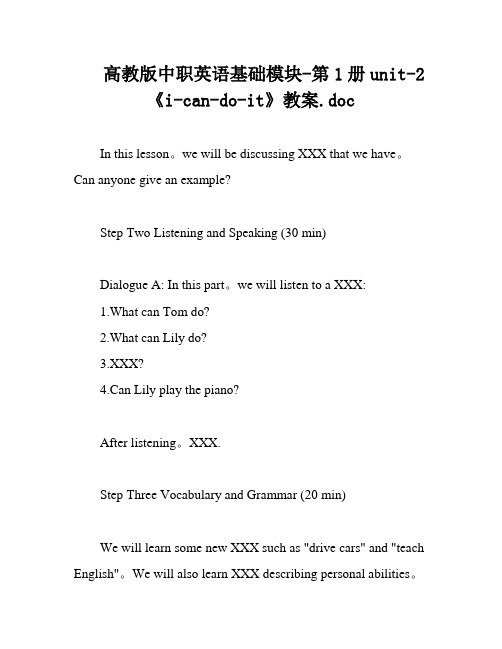
高教版中职英语基础模块-第1册unit-2《i-can-do-it》教案.docIn this lesson。
we will be discussing XXX that we have。
Can anyone give an example?Step Two Listening and Speaking (30 min)Dialogue A: In this part。
we will listen to a XXX:1.What can Tom do?2.What can Lily do?3.XXX?4.Can Lily play the piano?After listening。
XXX.Step Three Vocabulary and Grammar (20 min)We will learn some new XXX such as "drive cars" and "teach English"。
We will also learn XXX describing personal abilities。
such as "Can you say something about yourself?" and "Well。
I can teach English and I can speak a little Chinese."Step Four Interview and Writing (20 min)We will practice interviewing our classmates about their personal abilities and writing down their answers。
This will help us practice using XXX.Step Five n (10 min)We will take some time to reflect on what we learned today and how it can be applied in our daily lives。
高教社中职英语基础模块一Unit1 Personal and Family Llife单元知识清单
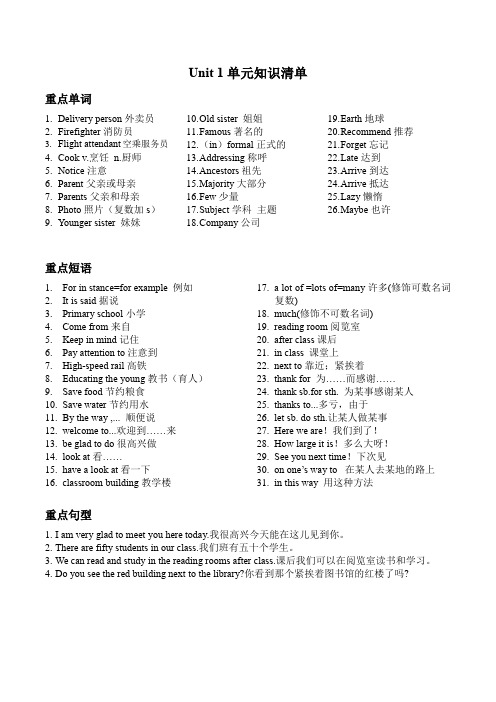
Unit 1单元知识清单重点单词1.Delivery person外卖员2.Firefighter消防员3.Flight attendant空乘服务员4.Cook v.烹饪n.厨师5.Notice注意6.Parent父亲或母亲7.Parents父亲和母亲8.Photo照片(复数加s)9.Younger sister 妹妹10.O ld sister 姐姐11.F amous著名的12.(in)formal正式的13.A ddressing称呼14.A ncestors祖先15.M ajority大部分16.F ew少量17.S ubject学科主题18.C ompany公司19.E arth地球20.R ecommend推荐21.F orget忘记22.L ate达到23.A rrive到达24.A rrive抵达25.L azy懒惰26.M aybe也许重点短语1.For in stance=for example 例如2.It is said据说3.Primary school小学e from来自5.Keep in mind记住6.Pay attention to注意到7.High-speed rail高铁cating the young教书(育人)9.Save food节约粮食10.Save water节约用水11.By the way ,... 顺便说12.welcome to...欢迎到……来13.be glad to do很高兴做14.look at看……15.have a look at看一下16.classroom building教学楼17.a lot of =lots of=many许多(修饰可数名词复数)18.much(修饰不可数名词)19.reading room阅览室20.after class课后21.in class 课堂上22.next to靠近;紧挨着23.thank for 为……而感谢……24.thank sb.for sth. 为某事感谢某人25.thanks to...多亏,由于26.let sb. do sth.让某人做某事27.Here we are!我们到了!28.How large it is!多么大呀!29.See you next time!下次见30.on one’s way to 在某人去某地的路上31.in this way 用这种方法重点句型1.I am very glad to meet you here today.我很高兴今天能在这儿见到你。
- 1、下载文档前请自行甄别文档内容的完整性,平台不提供额外的编辑、内容补充、找答案等附加服务。
- 2、"仅部分预览"的文档,不可在线预览部分如存在完整性等问题,可反馈申请退款(可完整预览的文档不适用该条件!)。
- 3、如文档侵犯您的权益,请联系客服反馈,我们会尽快为您处理(人工客服工作时间:9:00-18:30)。
• How old are you? • I’m seventeen. • Which class are you in? • I’m in Class 3,Grade 1. • Can you use the computer? • Yes,I can send e-mail,and I can
事,某件事
• 我能用英语打招呼 • I can greet people in English. • 我能谈论工作 • I can talk about jobs. • 我能给出(说出)个人信息 • I can give personal information. • 我能使用代词 • I can use pronouns
Resume[rezju:’ mei] [ri’ zju:m] 简历, 履历,重新开始,重新占用,继续, 恢复
After the war he resumed his duties. • 战争之后他重新开始了他的职位。
• Will you please resume your seat? • 请您重新坐下,好吗?
• 造句练习
Can you say something about yourself?
• I can sing, I can dance, I can ride a bicycle.
• Can you say something about yourself?
• I can run, I can jump, I can play baseball
Can&Can’t
当我们要用英语表达”能做什么”或”会 做
什么”的时候,我们经常会用到Can.例如:
I can make a name card.我会做名片. She can spell the word.她能拼写这个 单词. He can sing English songs.他能唱英文 歌. They can use the computer.他们会使
• I can play tennis • I can play chess
• I can send e-mails • I can drive a car • I can speak French • I can play the piano
Can:情态动词,后接动词原 形,意思是”能,会”,常用来表 能力,表示”能做什么,会做什 么”.
• My telephone number is 0226385-4202
• What’ your address?
• My address is No.4 Hexi Street, Tianjin
• What’s your ability?
• I can use computer, read and write in English and use office software.
• I can speak a little Chinese. • Can you sing English song? • Yes, I can • Which class are you in? • I’m in class H1503
• I can talk about abilities. • I can fill in application form • I can serve visitors. • I can speak a little Chinese. • I can read and write in
• 造句练习:
• Can you say something about yourself?
• I can sing, I can dance, I can ride a bicycle,I can paint.
• I can speak English,I can read
in Chinese,I teach English.
play computer games.
• 在英语国家,年龄(age)是个敏感的
话题,一般不要问成年人,尤其是成 年女性的年龄.
application for employment
• May I have your name , please?(Sally)
• How old is Sally? (25) • What can Sally do?(开车、用
Join 和take part in区别 • Join指参加组织、党派,成为其
中一员 • Take part in 指参加群众性的活动、
会议、游行
• Will you take part in the English evening?
• 同我们一起参加英语晚会好吗? • May I join in the game? • 我能参加比赛吗?
上特殊疑问词.
电脑、用英语和法语写作)
• What position does Sally want to apply for?(销售经理)
Sally wants to apply for sales manager.
• What’s Sally’s e-mail address?
• ()
• What’s your telles manager gender position club ability application objective求职意向
I’d like to French employment resume
➢join the club
• 翻译 • 我加入了天使俱乐部 • I joined the Angel Club. • 我参加活动 • I take part in the activity. • 他想去参军 • He wants to join the army.
如: 我能服务顾客.
I can serve customers.
我能修理电脑.
I can repair computers.
➢repair /ri`peə/ v.修理 ➢Computer/kəm`pʝu:tə/n.计算机 ➢serve /sɜ:v/v.服务 ➢customer / `kʌstəmə/n.顾客 ➢teach /ti:ʧ/v.教,教书 ➢something /sʌmɵiɧ/pron.一些
Can不随人称变化而变化,其后跟动词 原形.
当我们要表达”不能做什么”或”不会 做什么”的时候,就要Can 的否定形式,即 Cannot.Cannot常用于比较正式的书面表 达,而在日常生活中,我们常用它的缩略形 式,即Can’t.如:
I can’t swim.我不会游游.
He can’t read in English.他读不懂英文.
We can’t cook.我们不会做饭.
当我们询问他人”是否能做什么 ”或”是否会做什么”的时候,就要 用can的疑问句.如:
Can you cook?你会做饭吗?
Can he drive a car?他会开车吗?
What can you do?你会做什么呢?
Can的一般疑问句,是把can提到 句首,如果是特殊疑问句,还要在其加
